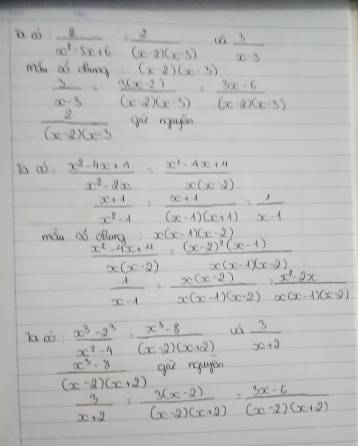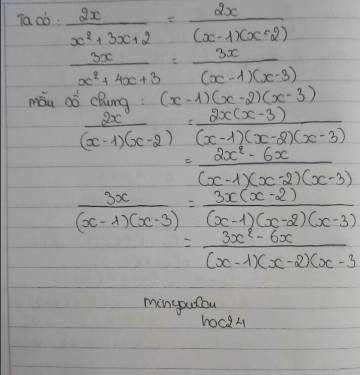
Hãy nhập câu hỏi của bạn vào đây, nếu là tài khoản VIP, bạn sẽ được ưu tiên trả lời.


d) \(4x^4-x^2=x^2\left(4x^2-1\right)=x^2\left(2x-1\right)\left(2x+1\right)\)
e) Ta có: \(6x^2-7x-5\)
\(=6x^2-10x+3x-5\)
\(=2x\left(3x-5\right)+\left(3x-5\right)\)
\(=\left(3x-5\right)\left(2x+1\right)\)
f: Ta có: \(-4x^2+23x-15\)
\(=-4x^2+20x+3x-15\)
\(=-4x\left(x-5\right)+3\left(x-5\right)\)
\(=\left(x-5\right)\left(-4x+3\right)\)

Bạn tham khảo tại đây nhé: Câu hỏi của Nghĩa Nguyễn - Toán lớp 9 - Học toán với OnlineMath.
Chúc bạn học tốt!

a: \(=\dfrac{6x^2+9x+8x+12}{2x+3}=\dfrac{3x\left(2x+3\right)+4\left(2x+3\right)}{2x+3}\)
=3x+4
b: \(=\dfrac{5x^2-2x+15x-6}{5x-2}\)
\(=\dfrac{x\left(5x-2\right)+3\left(5x-2\right)}{5x-2}=x+3\)
c: \(=\dfrac{-8x^2+20x+2x-5-10}{2x-5}=-4x+1+\dfrac{-10}{2x-5}\)
d: \(=\dfrac{14x^2-35x+2x-5}{2x-5}=\dfrac{7x\left(2x-5\right)+\left(2x-5\right)}{2x-5}\)
=7x+1
e: \(=\dfrac{2x^3+x^2+6x^2+3x+12x+6}{2x+1}\)
\(=\dfrac{x^2\left(2x+1\right)+3x\left(2x+1\right)+6\left(2x+1\right)}{2x+1}=x^2+3x+6\)
f: \(=\dfrac{x^3-2x^2+6x^2-12x+x-2}{x-2}=x^2+6x+1\)
g: \(=\dfrac{12x^3+6x^2-4x^2-2x+6x+3}{2x+1}=6x^2-2x+3\)

chuyển vế sang r phân tích thành nhân tử, có thể dùng máy tính bỏ túi nhé bạn
câu 1: 9\(x^2\) + 12\(x\) + 5 =11
(3\(x\))2 + 2.3.\(x\) .2 + 22 + 1 = 11
(3\(x\) + 2)2 = 11 - 1
(3\(x\) + 2)2 = 10
\(\left[{}\begin{matrix}3x+2=\sqrt{10}\\3x+2=-\sqrt{10}\end{matrix}\right.\)
\(\left[{}\begin{matrix}3x=\sqrt{10}-2\\3x=-\sqrt{10}-2\end{matrix}\right.\)
\(\left[{}\begin{matrix}x=\dfrac{\sqrt{10}-2}{3}\\x=\dfrac{-\sqrt{10}-2}{3}\end{matrix}\right.\)
Vậy S = {\(\dfrac{-\sqrt{10}-2}{3}\); \(\dfrac{\sqrt{10}-2}{3}\)}
Câu 2: 6\(x^2\) + 16\(x\) + 12 = 2\(x^2\)
6\(x^2\) + 16\(x\) + 12 - 2\(x^2\) = 0
4\(x^2\) + 16\(x\) + 12 = 0
(2\(x\))2 + 2.2.\(x\).4 + 16 - 4 = 0
(2\(x\) + 4)2 = 4
\(\left[{}\begin{matrix}2x+4=2\\2x+4=-2\end{matrix}\right.\)
\(\left[{}\begin{matrix}2x=-2\\2x=-6\end{matrix}\right.\)
\(\left[{}\begin{matrix}x=-1\\x=-3\end{matrix}\right.\)
S = { -3; -1}
3, 16\(x^2\) + 22\(x\) + 11 = 6\(x\) + 5
16\(x^2\) + 22\(x\) - 6\(x\) + 11 - 5 = 0
16\(x^2\) + 16\(x\) + 6 = 0
(4\(x\))2 + 2.4.\(x\) . 2 + 22 + 2 = 0
(4\(x\) + 2)2 + 2 = 0 (1)
Vì (4\(x\)+ 2)2 ≥ 0 ∀ ⇒ (4\(x\) + 2)2 + 2 > 0 ∀ \(x\) vậy (1) Vô nghiệm
S = \(\varnothing\)
Câu 4. 12\(x^2\) + 20\(x\) + 10 = 3\(x^2\) - 4\(x\)
12\(x^2\) + 20\(x\) + 10 - 3\(x^2\) + 4\(x\) = 0
9\(x^2\) + 24\(x\) + 10 = 0
(3\(x\))2 + 2.3.\(x\).4 + 16 - 6 = 0
(3\(x\) + 4)2 = 6
\(\left[{}\begin{matrix}3x+4=\sqrt{6}\\3x+4=-\sqrt{6}\end{matrix}\right.\)
\(\left[{}\begin{matrix}3x=-4+\sqrt{6}\\3x=-4-\sqrt{6}\end{matrix}\right.\)
\(\left[{}\begin{matrix}x=\dfrac{\sqrt{6}-4}{3}\\x=-\dfrac{\sqrt{6}+4}{3}\end{matrix}\right.\)
S = {\(\dfrac{-\sqrt{6}-4}{3}\); \(\dfrac{\sqrt{6}-4}{3}\)}

Lời giải:
Ta có:
\(C=\frac{5(x^2-4x+4)-2x+5}{x^2-4x+4}=\frac{5(x-2)^2-2(x-2)+1}{(x-2)^2}=5-\frac{2}{x-2}+\frac{1}{(x-2)^2}\)
Đặt $\frac{1}{x-2}=t$ thì:
$C=t^2-2t+5=(t-1)^2+4\geq 4$ với mọi $t$
$\Rightarrow C_{\min}=4$. Vậy GTNN của $C$ là $4$. Giá trị này đạt tại $t=1$
$\Leftrightarrow \frac{1}{x-2}=1\Leftrightarrow x=3$



Ai biết
\(2^{2x+3}+4^{x+2}=384\)
=>\(2^{2x}\cdot2^3+4^x\cdot16=384\)
=>\(4^x\cdot8+4^x\cdot16=384\)
=>\(4^x\cdot24=384\)
=>\(4^x=\dfrac{384}{24}=16=4^2\)
=>x=2